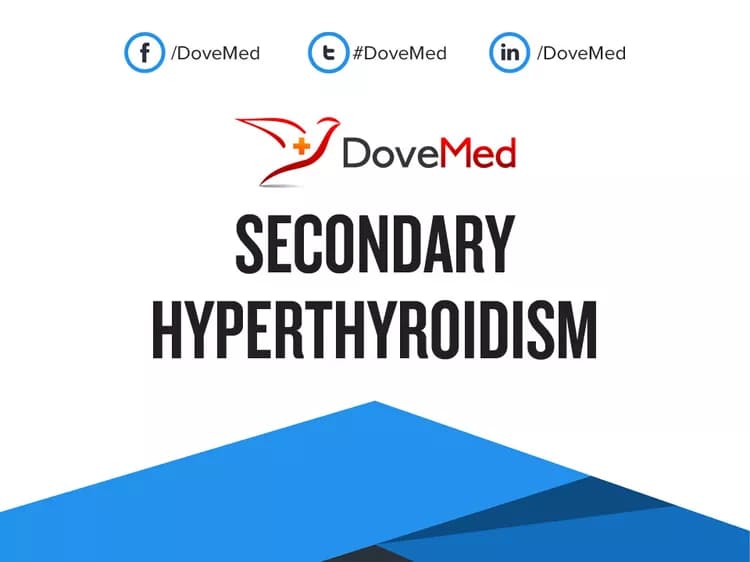What are the other Names for this Condition? (Also known as/Synonyms)
- Amiodarone-Induced Thyrotoxicosis due to Secondary Hyperthyroidism
- Hyperactive Thyroid Gland due to Secondary Hyperthyroidism
What is Secondary Hyperthyroidism? (Definition/Background Information)
- Hyperthyroidism is a condition in which the thyroid gland (present in the neck) is overactive and produces too much of the hormone thyroxine.
- Thyroxine is responsible for regulating the body's metabolism; it stimulates cells of the body to produce proteins, and also increases the amount of oxygen used by them. It also has a very important role in fetal brain development.
- Secondary Hyperthyroidism indicates that the dysfunction is caused by factors extrinsic to the thyroid gland (i.e., not due to a disorder in the gland). In contrast, primary hyperthyroidism occurs when the dysfunction is caused by abnormal functioning of the thyroid gland itself
- The condition is very rare in contrast to primary hyperthyroidism, which is fairly common. The most common cause of Secondary Hyperthyroidism is thyroid stimulating hormone (TSH) secreting pituitary adenoma
- Some of the signs and symptoms of Secondary Hyperthyroidism include rapid weight loss, irritability, heat sensitivity, diarrhea, irregular heartbeat, sweating, and fatigue
- The complications associated with the condition may include osteoporosis, abnormal heart conditions, and thyroid storm or thyroid crisis
- The prognosis of Secondary Hyperthyroidism is generally good with appropriate treatment
Who gets Secondary Hyperthyroidism? (Age and Sex Distribution)
- Secondary Hyperthyroidism is more common in women than men
- The condition is prevalent around the world; all racial and ethnic groups may be affected
What are the Risk Factors for Secondary Hyperthyroidism? (Predisposing Factors)
Risk factors associated with Secondary Hyperthyroidism include:
- Smoking
- Gender: Women are at higher risk than men
It is important to note that having a risk factor does not mean that one will get the condition. A risk factor increases ones chances of getting a condition compared to an individual without the risk factors. Some risk factors are more important than others.
Also, not having a risk factor does not mean that an individual will not get the condition. It is always important to discuss the effect of risk factors with your healthcare provider.
What are the Causes of Secondary Hyperthyroidism? (Etiology)
The causes associated with Secondary Hyperthyroidism may include:
- Thyroid stimulating hormone secreting pituitary adenoma: The pituitary is a gland that produces the TSH, which regulates the production of thyroxine by the thyroid gland. Some adenomas cause the secretion of excess hormones
- Gestational thyrotoxicosis: Hyperthyroidism during pregnancy, due to a hormone called human chorionic gonadotropin, which is responsible for the condition
- Human chorionic gonadotropin (HCG) producing tumor
What are the Signs and Symptoms of Secondary Hyperthyroidism?
The signs and symptoms of Secondary Hyperthyroidism may include:
- Rapid weight loss, fatigue
- Irritability, paranoia
- Heat sensitivity
- Diarrhea
- Tremors
- Irregular heartbeat, sweating, palpitations
- Thinning of skin
How is Secondary Hyperthyroidism Diagnosed?
The diagnosis of Secondary hyperthyroidism may require:
- Complete evaluation of medical history along with a thorough physical exam
- Diagnostic tests for Secondary Hyperthyroidism include:
- TSH blood test: High thyroid stimulating hormone (TSH) level may be observed
- T3 and T4 test: High serum T3 and T4 may be observed
- TRH test: Low levels of TRH (thyrotropin releasing hormone) can be seen
- Ultrasound scan of the thyroid gland
- CT scan of head or MRI of brain to detect tumors in the pituitary gland
Many clinical conditions may have similar signs and symptoms. Your healthcare provider may perform additional tests to rule out other clinical conditions to arrive at a definitive diagnosis.
What are the possible Complications of Secondary Hyperthyroidism?
Complications associated with Secondary Hyperthyroidism include:
- Osteoporosis: A condition causing brittle bones
- Heart disorders such as abnormal heart rhythm and heart failure
- Thyroid storm/crisis: It is a medical emergency that needs to be treated in a hospital. In this condition, there is a sudden worsening of the symptoms of hyperthyroidism, which may occur with an infection, and it includes abdominal pain, fever, and decreased alertness
How is Secondary Hyperthyroidism Treated?
Treatment of Secondary Hyperthyroidism includes:
- Treatment of the cause responsible for Secondary Hyperthyroidism such as a removal of pituitary adenoma or Human chorionic gonadotropin (HCG) secreting tumor
- Anti-thyroid drugs and B- blockers can be used to control the symptoms of hyperthyroidism
How can Secondary Hyperthyroidism be Prevented?
- There are no known methods to prevent the occurrence of Secondary Hyperthyroidism
- Individuals at risk should refrain from smoking and regularly follow-up with a physician to ensure early detection
What is the Prognosis of Secondary Hyperthyroidism? (Outcomes/Resolutions)
- With appropriate treatment the prognosis of Secondary Hyperthyroidism is good
- The prognosis depends on the underlying cause of the condition
Additional and Relevant Useful Information for Secondary Hyperthyroidism:
- Hyperthyroidism occurs in about 1 in 250 people in the United States
- TSH in conjunction with T4 is the starting point for testing, in order to evaluate the thyroid gland function. Some of the other tests, which are performed along with TSH include tests for T3 and for thyroid antibodies
The following article links will help you understand thyroid-stimulating hormone (TSH), total T3, and total T4 laboratory tests:
https://www.dovemed.com/common-procedures/procedures-laboratory/total-t3-blood-test/
https://www.dovemed.com/common-procedures/procedures-laboratory/total-t4-blood-test/
Related Articles
Test Your Knowledge
Asked by users
Related Centers
Related Specialties
Related Physicians
Related Procedures
Related Resources
Join DoveHubs
and connect with fellow professionals


0 Comments
Please log in to post a comment.